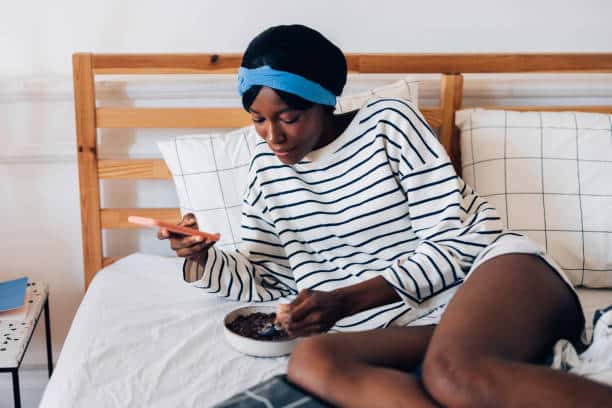
Few things are worse than tossing and turning, tired but somehow awake, unable to get those much-needed hours of sleep.
While disrupted sleep is fairly common, often caused by stress, caffeine, and trouble unwinding, sometimes there are more serious issues at play. For many people, the factors that influence sleep slip right under the radar.
Because even if they aren’t serious, they can certainly be mysterious.
Are you struggling to fall asleep or stay asleep, and simply can’t figure out why?
Then it’s time to figure it out, once and for all. Here are six reasons you may have never considered, and what you can do to address them…
RELATED: 10 Signs of Black Mold in Your Home
Can’t Sleep? Here’s Why
1. Bedroom Mold Spores
Believe it or not, mold in the bedroom might be an invisible disruptor of your sleep. The problem is, mold spores love damp environments like poorly ventilated rooms. This, in turn, can trigger respiratory issues and allergies that make it hard to sleep.
Research indicates that exposure to mold spores increases symptoms like nasal congestion and throat irritation, which keep you up throughout the night. This is particularly relevant to people living in urban communities, where older housing is more prone to mold. Combined with poor air quality, these festering spores make breathing problems even worse.
If you suspect mold, inspect your bedroom. Don’t forget to check corners, under windows, or near leaks. You should also use a dehumidifier to keep humidity below 50 percent, in accordance with EPA recommendations. And finally, wash regularly. Make sure to wash your bedding weekly in hot water, and for an extra boost, get an air purifier with a HEPA filter.
If the issue still won’t go away, a professional mold remediator can help.

2. Late-Evening Snacking
Sometimes, temptation wins.
But if you’re finding yourself repeatedly snacking late at night, especially on high-fat foods like fried chicken or some creamy dessert, now’s the time to cut back! High-fat foods, especially when eaten close to bedtime, are notorious for disrupting sleep, even triggering acid reflux and delaying gastric emptying.
According to one study from The American Journal of Clinical Nutrition, high-fat meals consumed within three hours of sleep increased wakefulness and reduced deep sleep by up to 20 percent. Given that obesity is a known concern in the Black community, addressing this issue is key.
Thankfully, the solution isn’t complicated. No matter what you eat, aim to finish eating at least three hours before bedtime. If you do want a snack, opt for lighter snacks like fruit or yogurt, especially foods rich in tryptophan, such as bananas. Tryptophan is great for boosting melatonin production, which promotes deeper, easier sleep.
RELATED: Does It Matter What You Eat or Drink Before Bed?
3. Wi-Fi Routers and Electromagnetic Fields
It’s hard to go anywhere these days without some kind of signal zipping around. Technology is simply a part of life, and unless you’re moving to the literal middle of nowhere, you can’t escape it. The same goes with Wi-Fi.
If you’re having trouble sleeping at night, it could be due to your Wi-Fi router. Often left on overnight, routers emit electromagnetic fields (EMFs) that can subtly disrupt sleep. Although the research continues, studies suggest that prolonged EMF exposure to devices like routers can have measurable effects. For one, they can alter melatonin production, which is crucial for good sleep.
In dense urban areas, technology infrastructures increase this level of exposure.
Fortunately, it’s pretty easy to address this. Turn off your Wi-Fi router at night or at least move it, keeping it no less than 10 feet from your bed. You should also use a timer to automate shut-off, and even consider wired internet connections if available.
By limiting your device use before bed, you can reduce the effects of both EMF and blue light.

4. Mismatched Pillows
Having the right pillow is everything.
If you have an ill-fitting pillow, it can cause more than discomfort—it can disrupt sleep by misaligning your spine. Research shows that improper pillow height not only increases neck muscle tension but also contributes to poor sleep quality and morning stiffness.
So don’t settle for just any pillow. Select a pillow that aligns your neck with your spine. If you sleep on your side, you need a thicker pillow, about four to six inches. By contrast, if you sleep on your back, you’ll do better with medium thickness, or two to four inches.
Try memory foam or cervical pillows, which are designed to support natural curvature. Just make sure to replace your pillows every one to two years to maintain support.
RELATED: Your Brain on Blue Light: Understanding the Science
5. Blue Light Exposure
Just like routers and devices can disrupt your sleep, so too can too much screentime. Staring at your phone, tablet, or TV before bed is a great way to ensure your sleep will suffer! It suppresses melatonin production, for one, and it doesn’t take much. Just two hours of blue light exposure in the evening can delay melatonin onset by an hour and a half.
So what do you do?
Obviously, it’s hard to completely detach from technology – but you don’t have to. All you need to do is avoid screens at least one hour before bed (often easier said than done). If you absolutely have to use a screen, put it in ‘night mode,’ or you can even use blue light-blocking glasses.
Try to establish a routine. Read a physical book, meditate, listen to calming sounds, whatever works for you, and signals to your brain it’s time to unwind.

6. Inconsistent Sleep Schedules
Irregular bedtimes and wake-up times can be a disaster for your body’s internal clock. When your circadian rhythm is disturbed, the time it takes to fall asleep can increase by 25 percent. External factors, such as work shifts, caregiving, and socioeconomic stress, all make this harder.
Solving this problem requires a consistent, honest approach. You want to ensure you’re going to bed and waking up around the same time, even on weekends. These times should be approximately within one hour, so there shouldn’t be much variation.
How do you do it? There are many ways to get your sleep schedule back on track. You can use sleep tracking apps to monitor patterns, which is especially popular nowadays. You can also create a pre-sleep routine that calms the body and mind. Think things like light stretching or journaling, or tranquil music and sounds.
And if weird shifts at work are messing with your internal clock, employ ‘power naps.’ These are brief periods to recharge, usually just 30 minutes max. Just make sure to use blackout curtains to simulate nighttime and essentially trick your brain into powering down.
Overall, sleep is a critical determinant of health, yet many Americans – especially Black Americans – face barriers to restful sleep. Housing inequities, economic stress, and healthcare disparities all contribute to higher rates of sleep disorders like insomnia and sleep apnea.
If you’re struggling to fall asleep or stay asleep, take a full-pronged approach. Adopt the strategies outlined in this article, and start catching those pesky Z’s you’ve been missing!
RELATED: Reclaiming Our Rest: How Better Sleep Can Transform Black Health









